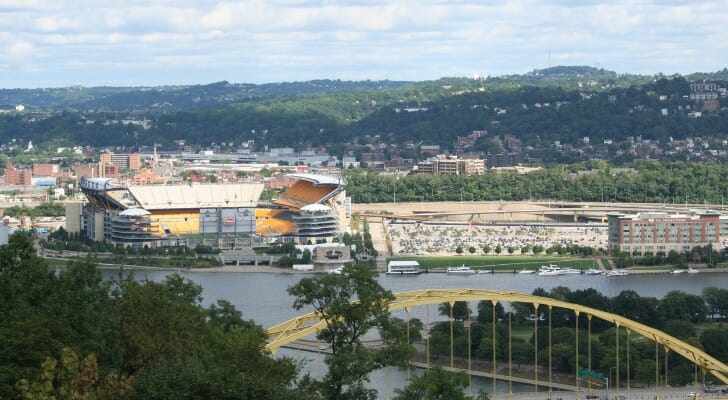The Steel City is known for its industrial history and its scrappy charm. Pittsburgh has also become popular due to its affordability for young creatives priced out of other cities, which has continued post-pandemic. Pennsylvania has relatively low state income taxes, as it uses a flat rate for all residents. There are some solid homebuying opportunities in Pittsburgh as well. If you’re thinking of moving there, here are the details on the cost of living in Pittsburgh. You can also work with a financial advisor to determine whether it’s a smart financial decision and to get your finances in order for the big move.
Pittsburgh Home Prices
Pittsburgh boasts some beautiful historic homes, along with newer builds and more affordable units. If you can afford a down payment for a Pittsburgh home, you’ll have a lot of good options. In fact, according to NeighborhoodScout, the majority of the houses in the Pittsburgh housing market are priced at $363,000 or less. The average cost of homes in the area remains low compared to other parts of the country at around $235,000.
Although homes are well-priced in the ‘Burgh, the homeownership rate among residents is just 44.4%. There may be some validity to this trend, though, as 2019 data from NeighborhoodScout also indicates that over half of the homes in this market were built in 1939 or before. That leaves very little for the standard homebuyer to think about buying, especially compared to more modern metropolises like New York and Boston.
Pittsburgh Rent
Similar to its housing market, rent in Pittsburgh is more expensive than in the surrounding areas but less expensive than in many large cities. The average rent in the Pittsburgh area is $1,427, regardless of the number of bedrooms. One-bedroom places average out at $1,027 per month and two-bedrooms at $1,276.
Are you on the rent side of the rent-or-buy decision or are you not sure what decision to make? A financial advisor can help you decide which route is best for you by analyzing the market and your personal finances.
Utility Costs in Pittsburgh
According to May 2019 data from Numbeo.com, the price of a basic package of utilities in Pittsburgh, including heating, water, electricity and garbage, costs an average of $171.52. This estimate is based on the cost of utilities for a 915-square-foot apartment. By contrast, the average utility price nationwide is almost $20 cheaper at $152.11.
Food Costs
Food in Pittsburgh is hardly expensive by national standards. Numbeo.com’s May 2019 data shows that the recommended minimum monthly budget for food in the city is $328.07, or $10.58 a day. That’s barely above the U.S. averages, which are $324.43 and $10.47, respectively.
If you want to go out to eat at a mid-range restaurant, the average cost of a meal for two is around $50, much cheaper than in cities like New York or San Francisco. Some of Pittsburgh’s most famous food items are inexpensive, so you can get a feel for the city’s culinary culture without breaking the bank. Some affordable Pittsburgh classics are Halupki (Eastern European meat and cabbage rolls), hot dogs, chipped ham and pierogies.
Cost of Transportation
In Pittsburgh, it helps to have a car. The city isn’t so big that you’ll find everything within the limits, but you can make do. If you don’t plan on driving while living in Pittsburgh, there are public transportation options. Bus service is free in downtown Pittsburgh, as well as the North Shore area between North Side Station and Allegheny Station.
In other areas, bus fare is $2.50 with a ConnectCard or $2.75 with cash. For an unlimited pass at full price, you’ll pay $97.50 per month or $1,072.50 annually.
Pittsburgh drivers can expect to pay high prices for gas. According to GasBuddy data from May 2019, the average price of a gallon of gas here is $3.11. That’s good for 24 cents more expensive than the $2.87 national average.
Pennsylvania usually tops the charts for the highest state taxes on gas and diesel fuel. As of 2019, a 58.7 cents per gallon tax is levied on normal gas purchases, while diesel purchases come with a 75.2 cents per gallon tax.
Pittsburgh Taxes
Property taxes in Pittsburgh’s home, Allegheny County, have an average effective rate of 2.08%. That’s higher than both Pennsylvania’s average effective rate and the nation’s.
When it comes to income taxes, Pittsburgh is a bit of a complex case. Like other Pennsylvania municipalities, Pittsburgh has a city-level income tax, with a rate of 1.50%. This percentage is then added to the 3.07% flat Pennsylvania income tax for a grand total of 4.57%.
Miscellaneous Cost of Living Facts

Pittsburgh is a great city for art lovers, too. Adult admission to the Carnegie Museum of Art will cost you $19.95; child admission (3-18) is $11.95. You can visit the Andy Warhol Museum for $20 and the kids for $10.
For contemporary art and an experimental lab that features installations created by artists-in-residence, head to the Mattress Factory. Admission is $20 for adults, $15 for students and free for children under six.
Pittsburgh is home to some rather passionate sports fans. Ticket prices vary by sport, though. If you’re looking to catch a game in Pittsburgh, here are the average prices for each of the city’s teams:
- Pittsburgh Steelers (NFL): $278 (SeatGeek, 2022)
- Pittsburgh Pirates (MLB): $47 (SeatGeek, 2022)
- Pittsburgh Penguins (NHL): $93 (SeatGeek, 2022)
The Bottom Line
Pittsburgh can be a great city to live in with its residents’ pride and local love for their sports teams. The cost of living can be good for a city of its size and it’s typically much more affordable when compared to other large cities in the northeast part of the country, such as New York City or Boston. If you’re thinking about moving to the city then you’ll want to consider all of the costs related to your situation before making a decision.
Next Steps
- Financial advisors can be very helpful in navigating the financial implications of a move to a new city. SmartAsset’s free tool matches you with up to three financial advisors who serve your area, and you can interview your advisor matches at no cost to decide which one is right for you. If you’re ready to find an advisor who can help you achieve your financial goals, get started now. While you’re at it, check out SmartAsset’s list of Pittsburgh’s top 10 financial advisor firms.
- One of the first things you’ll want to do when you move to a new area is depositing your money with a new, possibly local, bank. Here are a few to begin with: Dollar Bank, The Bryn Mawr Trust Company, First Keystone Community Bank, Prudential Bank and First National Bank of Pennsylvania.
Photo credit: ©iStock.com/HaizhanZheng, ©iStock.com/JamesHanlon
